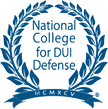Washington DUIs: What You Need to Know
Every state has laws against driving while under the influence, and Washington’s Revised Code, Section 46.61.504 is no different. This law covers not just “driving” but being in “actual physical control” of a vehicle while intoxicated, meaning you can be charged even if you’re simply sitting in your car.
Learn More Seattle DUI Laws
Physical Control & The Elements of a DUI
The standard legal limit in Washington is a 0.08% BAC, but this drops to 0.02% for those under 21 and 0.04% for commercial drivers. Prosecutors must prove the key elements of drunk driving to secure a DUI conviction. Specifically, this means that you were driving or had actual control of the vehicle and were under the influence of or affected by alcohol or drugs. Also, you can be charged with DUI or Physical Control even if you were under the influence or affected by prescription drugs.
Being under the influence can be demonstrated in various ways, including observable signs of impairment or DUI breath or blood testing. The definition of DUI extends beyond merely driving. “Actual physical control” has been interpreted to mean that if you were positioned to operate the vehicle you can also be charged. Even being seated in your car without moving can lead to a Physical Control arrest.
Learn About Washington BAC Laws
Seattle DUI Penalties
Most DUIs are gross misdemeanors in Washington, punishable by fines and up to a year in jail. If you are charged with a fourth DUI within 10 years, you will be charged with a Class B felony.
BAC – < .15 or No Test
1st DUI within 7 Years
- Jail Time – 24 Hours or 15 days EHM
- Mandatory Electronic Home Monitoring (EHM) – Not Available
- Fines – $990.50
- License Penalty – 90 Day Suspension
- Interlock Device– Required
- Counseling/Treatment – As Ordered
Penalty – 1 Prior DUI within 7 Years
- Jail Time – 30 Days
- Mandatory Electronic Home Monitoring (EHM) – 60 Days
- Fines – $1,245.50
- License Penalty – 2 Year Revocation
- Interlock Device – Required
- Counseling/Treatment – As Ordered
Penalty – 2-3 DUIs within 7 Years
- Jail Time – 90 Days
- Mandatory Electronic Home Monitoring (EHM) – 120 Days
- Fines– $2,095.50
- License Penalty – 3 Year Revocation
- Interlock Device – Required
- Counseling/Treatment – As Ordered
BAC – ≥ .15 or Test Refusal
Penalty – 1st DUI within 7 Years
- Jail Time – 2 Days or 30 days EHM
- Mandatory Electronic Home Monitoring (EHM) – 30 Days
- Fines – $1,245.50
- License Penalty – 1 Year Revocation (2 if Refusal)
- Interlock Device – Required
- Counseling/Treatment – As Ordered
Penalty – 1 Prior DUI within 7 Years
- Jail Time – 45 Days
- Mandatory Electronic Home Monitoring (EHM) – 90 Days
- Fines – $1,670.50
- License Penalty – 900 Days (3 Years if Refusal)
- Interlock Device – Required
- Counseling/Treatment – As Ordered
Penalty – 2-3 DUIs within 7 Years
- Jail Time – 120 Days
- Mandatory Electronic Home Monitoring (EHM) – 150 Days
- Fines – $2,945.50
- License Penalty – 4 Year Revocation
- Interlock Device – Required
- Counseling/Treatment– As Ordered
What to expect in your DUI case depends on your record, BAC, and the details involved. Always consult with a local DUI attorney for a detailed assessment.
Your License after a Seattle DUI
When people are arrested for driving under the influence, one of their biggest concerns usually revolves around their ability to drive. After all, people typically need a license to get to work or school and care for their families.
When you’re arrested for a DUI in Washington, you face what is known as an administrative license suspension (ALS). This is a civil consequence of a DUI arrest, not a criminal punishment. Therefore, you must deal with your ALS independently from the criminal proceedings.
You Can Face ALS For:
- Exceeding the legal BAC limit; or
- Refusing a DUI breath test at the police station.
A first time DUI conviction with a BAC over the limit results in a 90-day license suspension. Being convicted of a first time DUI after refusing the breath test at the station results in a one-year license suspension. The DOL can suspend your license for much longer if you have multiple DUI prior convictions.
It’s crucial to act fast. The ALS takes effect post-arrest unless you request a civil hearing with Washington’s Department of Licensing (DOL) within 7 days of your arrest date.
A Seattle DUI attorney can explain the ALS process and potentially contest the suspension. Each situation is unique.
Collateral Effects of a DUI
Beyond the immediate penalties of a DUI, having a criminal record can disrupt virtually every aspect of your life.
A DUI on Your Record Causes:
- Issues pursuing or continuing education
- Employment struggles or job loss
- Complications or denials in acquiring professional licenses
- Reduced child custody or visitation rights
- Immigration status concerns and potential deportation
- Travel restrictions
- For felony convictions, loss of firearm rights and voting rights
The King County DUI Process
When you’re arrested for DUI in King County, you may be booked into the local jail, photographed, fingerprinted, and processed. Depending on the circumstances, you might be released when the police believe you are no longer a danger to yourself or others. But sometimes, bail might be required to secure your release after a DUI arrest.
Following your arrest, you must attend an arraignment in one of the district courts, such as Seattle, Redmond, or Kent. Here, you’ll learn of the official charges and enter a plea.
After the arraignment, your attorney will review the police report, consult with you, commence negotiations with the prosecutor, file any appropriate legal motions to address evidentiary deficiencies. If no resolution is reached, the case may proceed to trial.
Work with a Seattle DUI Lawyer
Dealing with a DUI in Seattle or anywhere in the state can feel overwhelming, but a capable DUI defense lawyer can help.
Your attorney can explain the process, look for opportunities to improve the situation, and, most importantly, advocate for your interests. This can include reducing the possible penalties, preserving your ability to drive, or potentially working toward a complete dismissal if the case against you has evidentiary issues.
Defending Against a DUI in WA
Being charged with a DUI does not guarantee you’ll be convicted. The prosecutor has a lot of work to do before that happens.
There are numerous defense strategies that a DUI attorney can employ to contest the charges or even have them dismissed. Common defenses include challenging the traffic stop’s legality, the search’s validity, contesting inadmissible DUI evidence, questioning the results of faulty blood or breath tests, and presenting medical conditions that might mimic signs of intoxication.
It’s crucial to consult with a skilled DUI attorney to ensure every option is being explored. While public defenders are competent attorneys, their caseloads often prevent them from giving individual cases extensive attention.
Alternative DUI Punishments & Deferred Prosecution
While a DUI can sometimes result in time behind bars, a lawyer can significantly reduce the impact on your life and freedom even if you’re convicted. Your attorney can advocate for jail time to be served as Electronic Home Monitoring (EHM). For instance, for first-time DUI offenders, it’s common to substitute jail time with EHM, allowing you to go to and from work, doctor’s appointments, treatment, and other court-approved activities.
Deferred DUI Prosecution
Washington State also allows for Deferred Prosecution under RCW 10.05 which offers people struggling with alcoholism, substance addiction, or mental health conditions the chance to undergo treatment instead of the immediate legal penalties for a DUI. Eligible participants must adhere to a court-approved treatment plans, typically spanning two years, and meet strict court conditions over a five-year period.
If successfully completed, the DUI charge can be dismissed, sparing you a conviction on your record. However, failure to comply can result in the court entering a conviction and imposing the original sentencing. Additionaly, being admitted to deferred prosecution is not guaranteed. An experienced lawyer can be instrumental in navigating this process, ensuring eligibility, advocating for court approval, and helping you adhere to the program’s rigorous demands.






